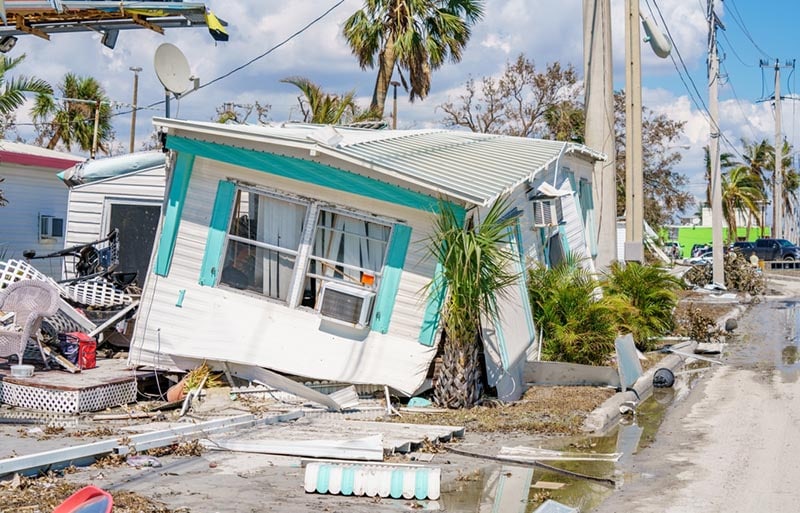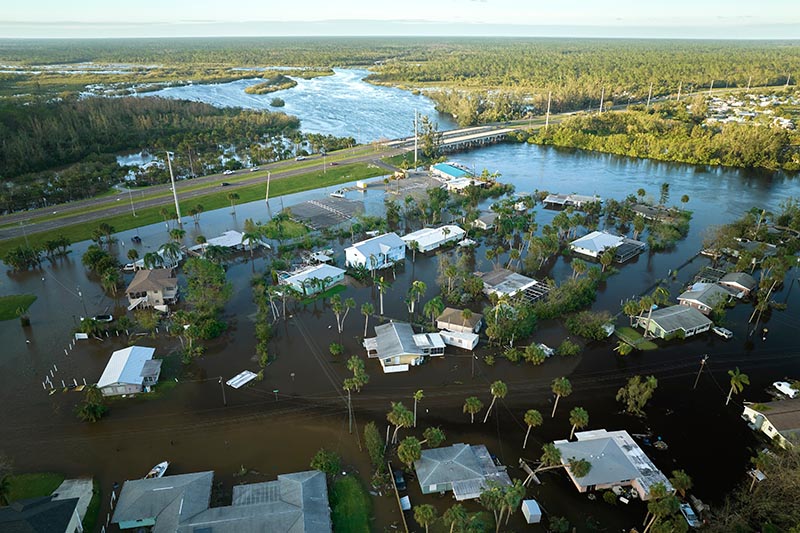Does Renters Insurance Cover Hurricane Damage? Facts & FAQs
-
- Last updated:

Hurricanes also referred to as typhoons in some parts of the world are tropical cyclones characterized by sustained winds of 64 knots (74 mph) or higher. The winds are usually strong enough to destroy homes, as they tend to carry with them debris that acts as flying missiles.
You can clearly see how this could be a serious concern for someone living in a hurricane-prone region. Constantly having to think about ways of protecting your home should there be a storm or hurricane coming is both mentally and emotionally taxing.
While we can’t stop such natural phenomena from occurring, we could still do something to shield ourselves against the concomitant risks. And that’s where renter’s insurance comes in. Thanks to this, we could repair or replace our damaged properties and settle other expenses.

What’s Covered by Renters Insurance?
Traditional renter’s insurance coverage is often divided into three parts. Policy providers usually draft them in sections to make it easier for policyholders to fully understand the terms and conditions, and to avoid confusion. Your coverage will take care of:
- Personal Property: Anything and everything that will be damaged in the apartment will be paid for. That includes your cookware, clothes, pieces of furniture, etc.
- Liability & Medical Expenses: Under the liability cover, the insurer will gladly offer coverage to any third-party damage, but only if the policyholder is legally required to settle the expenses. This is contrary to the medical coverage that doesn’t demand any proof of obligation that the holder is to pay for the expenses.
- Loss of Use: You’ll be reimbursed should you incur Additional Living Expenses (ALE) as a result of the damage caused.
These coverages don’t just automatically kick in. They’ll only do so IF the damage was caused by a peril listed on the insurance policy.
A lot of us seem to forget that a hurricane can damage one’s property in more than one way. Policy providers are well-acquainted with that fact, and that’s why they always make sure the details written on the agreement are crystal clear. Any keen individual will quickly realize that not all hurricane-related damages are covered by such policies.
The perfect example of damage not covered by a conventional renter’s policy is the water damage caused by a storm surge or flooding. Don’t be too quick to make assumptions, and always seek out knowledge if you wish to avoid losses. Because in the eyes of the policy provider, damaged goods are not just damaged goods. What really defines them is the type of peril involved. If you’d like to be reimbursed in full, the peril has to be covered by the renter’s insurance.
It’s pretty obvious to everyone that hurricanes are characterized by strong winds and lots of water. However, figuring out what actually ruined your piece of furniture, and convincing the provider it’s one of the perils listed on the cover, is no Sunday picnic.
They’ll still want to know if the hurricane was responsible for the damage inflicted on your property, or if it was caused by a flood facilitated by the saturated soils in the region. In case we weren’t clear the first time around, flood damage is explicitly excluded from renter’s insurance.
You’ll only be paid if you’re able to prove that the winds blew the roof off, thus exposing your personal items to the different weather elements. Assuming the windstorms are listed as a peril, you should be expecting your check sooner than later.
Those living in flood-prone areas are always encouraged to go for the flood insurance policy that protects all the contents in the house. That’s the only way that you’ll be able to avoid a lot of the nit-picking at a time when you’ll likely be distraught.

Does Renters Insurance Cover Mandatory Evacuations?
More often than not, we’ve seen people being forced to evacuate regions adversely affected by hurricanes. Does the policy cover their evacuation expenses? Not always. In fact, most policies don’t, and those that do, don’t cover everything.
Also, we’ve worked with insurers who are always willing to add the “prohibited use” coverage into a renters’ policy. So, in the event an insured homeowner is forced to vacate “due to the damages inflicted on a neighboring property by a covered peril”, their Additional Living Expenses are well catered to.
If you’ve tried to file a claim and got rejected, don’t lose hope. The Federal Emergency Management Agency will help you get back on your feet, by offering financial assistance. They usually have quite a number of programs set up, dedicated to helping hurricane victims.
Can You Claim Loss of Use If the Power Goes Out During a Hurricane?
Even though power outages are a common occurrence during hurricanes, policy providers don’t usually list it as a peril under the Loss of Use coverage. When you try to file a claim, they’ll hit you with a rejoinder explaining how the lack of electricity doesn’t make a home uninhabitable.
But if there was food in the refrigerator, and it got spoiled due to the outage, they’ll be happy to reimburse you. Just don’t forget to take photos because you’ll need them as evidence when the time comes.
Looking for home RENTERS insurance?

Lemonade offers some of the best insurance plans you can find on the market today!

Conclusion
Before signing off, we’d like you to know that the flood insurance policy doesn’t usually cover Additional Living Expenses. Even if the expenses were incurred due to flooding, you won’t be reimbursed for living outside your rental apartment. If you’d like to be covered on all fronts, combine the two insurance products.
And remember; lives are often lost during hurricanes. Evacuate if need be, even if the Additional Living Expenses won’t be covered.
You might also like:
- Does Renters Insurance Cover Car Theft? Everything You Need To Know!
- Does Renters Insurance Cover Temporary Housing? Everything You Want to Know!
Featured Image Credit: Felix Mizioznikov, Shutterstock
Contents

